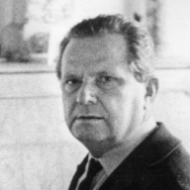Páleníček Josef
- Year of Birth - Death :
- 1914 - 1991
Biography
The composer, pianist and teacher Josef Palenicek entered Prague musical life as a piano virtuoso of outstanding qualities. His first solo concerts in the middle of the thirties were always awaited and received as artistic events of prime significance. Palenicek' s exceptional talent had already been evident in his childhood, it was at the age of twelve that he appeared in his first soloistic concert, on the programme of which, apart from other demanding compositions, there was also Beethoven' s Appassionata! When his family had moved from Olomouc to Prague he studied first privately and then at the Master' s piano school of Conservatoire with Professor Karel Hoffmeister. He graduated with a performance of his own Piano sonata (1938). In this work one can already recognize some distinctive marks of his later compositional style. Palenicek studied composition under Otakar Sin and Vitezslav Novak and later furthered his education as a composer at the Ecole normale de musique in Paris with Albert Roussel (1936 - 38).
After Palenicek's highly acclaimed concerts and recitals in Czechoslovakia there followed numerous successes as a soloist abroad: Great Britain, France, Belgium, the Soviet Union, Switzerland, Yugoslavia, Austria, Hungary, Turkey and other countries welcomed Palenicek as an outstanding piano virtuoso. In parallel with his soloistic activity he began to perform with chamber ensembles, mainly with the Czech Trio, whose birth he himself initiated. Alongside his career as pianist he was also teaching at the Academy of Performing Arts in Praha (after its establishment in 1946). After the Second World War Palenicek got involved in politics (became a member of the Communist Party), and he participated significantly in the formation of the concert section of the Union of Czechoslovak Composers.
Looking at the development of the artist's life one can see his performing activity as an inseparable part of his musical creation. Such a conjunction of composer and performer is usually a sign of great musical charge, great intensity of emotions. Palenicek himself found it difficult to imagine one form of activity without the other. He said of this, among other things: "I have been dealing with composition and interpretation simultaneously since my childhood and I do not know what my development as a pianist would have been like if I had not composed and on the contrary - how my composer's career would have been formed if I had not taken an active part in concerts. In any case my instrumental studies led me to the solution of special compositional problems and vice versa..."
Characteristic qualities of his playing are also projected in his compositions, the composer draws a great deal from his intimate knowledge of the instrument in composing his solo piano works and concertos with orchestra; he always managed to draw out not only the maximum considering the technical part of the composition, but he also managed to work in his compositions with wider scale of musical expression, and in great architectural wholes. His rich melodic invention made it possible for him to create great contrasts of dramatic heights and meditative poses. Palenicek had in his works touched on many genres; apart from numerous chamber compositions one must highly stress his three piano concertos, as well as the concertos for flute, clarinet and saxophone. In 1972 there was performed at the review of new works by Czech composers an important orchestral work by Palenicek, his Symphonic Variations on an Imaginary Portrait of Ilya Erenburg. This is an extensive composition, five symphonic pictures, the main content of which is the confrontation of the bright personality of Erenburg with the terrible situation in the world at the time of his death. The Symphonic Variations are mutually connected by the unifying thought given by the intention of the portrait. The composer expressed the central motto of the work as follows: "I see here a smiling face with a tear in the eye...".
Of special significance in Palenicek' s work as a composer is his Song of Man (1952-58). This is something between an oratorio and a cantata with an extremely important theme: the author set himself the task of depicting the historical rebirth of mankind in the modern era arousing from (mostly superstitious) old Christian belief to more rational knowledge, i.e. the development from earlier idealism (spiritualism) to modern materialism. The concept of the work was rather overwhelming, and - which is characteristic of Palenicek - expressed his very left-winged views. The author's intention called for an unusual formal solution. Palenicek's six-movement oratorio (Man Was Born, Ecce homo, Domini Canes, Mater dolorosa, The Morning Star, Man, that has a Noble Sound) was written for a big apparatus of orchestra, soloists, children's, academic and folk choirs in such a way that he attained a monumental apotheosis in the final declaration: "Our faith is in strength! Our truth is in ourselves!"
© 2012-2025 Musicbase.cz
Webdesign & hosting Nux Ltd.
Information about web | Sitemap | RSS | Statistics | CMS
Contact information
Music information center, o.p.s.
tel: 257 312 422 | e-mail: his@musica.cz

